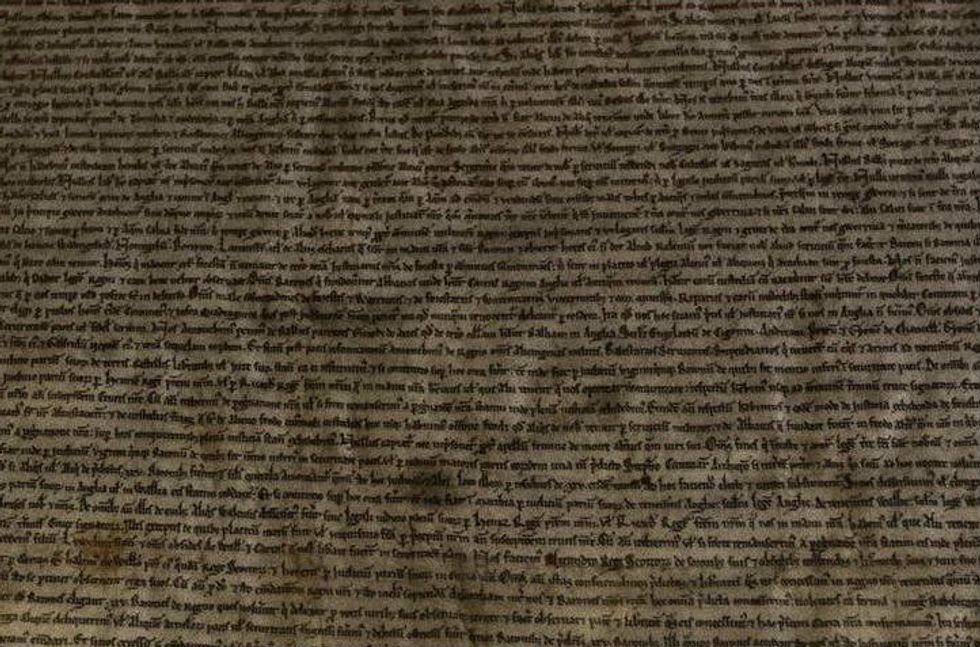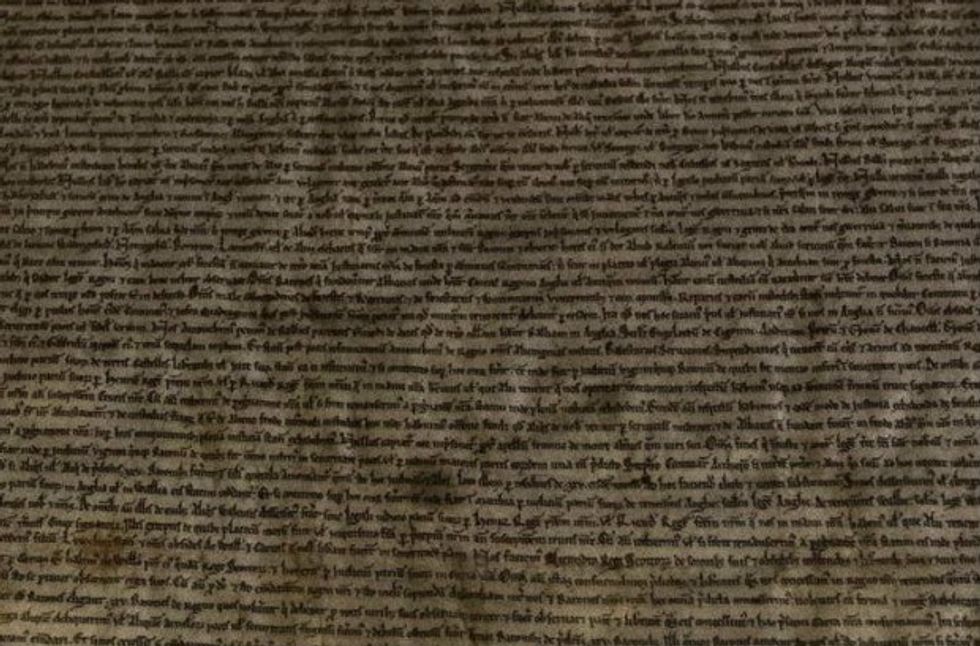As Americans living in the 21st century, it’s easy to take our freedoms for granted.
It’s easy to forget the centuries-long struggle, fraught with pitfalls and setbacks, that has outlined the modern conception of individual liberty as fundamental to our being. It wasn’t always this way.
This year, June 15 marks the 800th anniversary of the signing of the Magna Carta, and I can hardly think of a more fitting occasion to reflect on the ongoing fight for liberty in a historical context.
 Lines of manuscript text are seen through a glass cabinet on the Salisbury Cathedral 1215 copy of the Magna Carta as it is displayed with the three other surviving original parchment engrossments of the Magna Carta to mark the 800th anniversary of the sealing of Magna Carta at Runnymede in 1215, in the Queen's Robing Room at the Houses of Parliament in London, Thursday, Feb. 5, 2015. The four original copies of the charter have been put on display together for one day on Thursday for the opening of the exhibition "Magna Carta and Parliament" which runs during February. The Magna Carta established the timeless principle that no individual, even a monarch, is above the law. In 1215, 40 rebellious barons came together to declare their rights to King John, and he reluctantly consented to their demands in an attempt to avoid civil war. (AP Photo/Matt Dunham, Pool)
Lines of manuscript text are seen through a glass cabinet on the Salisbury Cathedral 1215 copy of the Magna Carta as it is displayed with the three other surviving original parchment engrossments of the Magna Carta to mark the 800th anniversary of the sealing of Magna Carta at Runnymede in 1215, in the Queen's Robing Room at the Houses of Parliament in London, Thursday, Feb. 5, 2015. The four original copies of the charter have been put on display together for one day on Thursday for the opening of the exhibition "Magna Carta and Parliament" which runs during February. The Magna Carta established the timeless principle that no individual, even a monarch, is above the law. In 1215, 40 rebellious barons came together to declare their rights to King John, and he reluctantly consented to their demands in an attempt to avoid civil war. (AP Photo/Matt Dunham, Pool)
The Magna Carta was a remarkable document. Even all these centuries later, it continues to stand as one of the most important recognitions that people - not just royalty and church leaders - but all people, have rights that must be defended by any government that regards itself as legitimate. In that regard, it stands second only to the Bill of Rights, and indeed, many of the protections enshrined in the first 10 Amendments to our Constitution can trace their philosophical and political origins all the way back to the 13th century.
For example, one of the few clauses of the original charter that still remains in British law today guarantees the right to due process and just treatment by the law that we have variously enshrined in the Fourth, Fifth and Sixth Amendments in the Bill of Rights. This strikes me as especially important to note, given our current national debates on policies such as surveillance and the criminal justice system.
There are those who seem to view the Bill of Rights almost as an annoyance, as an impediment to doing what they want to do, when they want to do it.
Sen. Rand Paul’s recent challenge to the NSA’s authority to collect data from innocent Americans not suspected of a crime raised hackles among those who see him as an obstructionist. Why, they wondered, does he have to get in the way of national security agencies doing their job?
The answer is that due process matters. It mattered 800 years ago, and it matters today. It’s what separates a civilized society from one ruled in tyranny. One would think that after all these centuries, the point would no longer need demonstrating, but as Thomas Jefferson is alleged to have said, “eternal vigilance is the price of liberty.”
Due process is also under assault in the practice of civil asset forfeiture, where law enforcement can seize private property without so much as charging the owner with a crime. The obtaining of warrants or establishment of probable cause should not be viewed as inconveniences. Instead, we should recognize that they are of vital necessity to protect freedom and guard against the abuses of power that, as Lord Acton observed, will always be inherently corrupting.
Fortunately, due to overwhelming pressure from a grassroots movement that understands the importance of checks on government power, states like New Mexico and Montana have moved to reform civil asset forfeiture, and preserve the due process guaranteed to all citizens by the Constitution. The eternal vigilance of the people is paying off.
On June 15, it would behoove us all to take a moment and think about the long road we’ve taken. All the way back to Aristotle, up to the signing of the Magna Carta, to John Locke and Adam Smith, to Thomas Jefferson and Frederick Bastiat, and even up to the men and women fighting today to preserve and expand the preference for individualism over collectivism, for freedom over slavery. The Magna Carta may be 800 years old, but it’s clear from the headlines we read every day that its influence is still a powerful and relevant force in the modern world.
Adam Brandon is the CEO of FreedomWorks, a non-profit organization that mobilizes grassroots activists nationwide. Follow him on Twitter @adam_brandon
–
TheBlaze contributor channel supports an open discourse on a range of views. The opinions expressed in this channel are solely those of each individual author.


 Lines of manuscript text are seen through a glass cabinet on the Salisbury Cathedral 1215 copy of the Magna Carta as it is displayed with the three other surviving original parchment engrossments of the Magna Carta to mark the 800th anniversary of the sealing of Magna Carta at Runnymede in 1215, in the Queen's Robing Room at the Houses of Parliament in London, Thursday, Feb. 5, 2015. The four original copies of the charter have been put on display together for one day on Thursday for the opening of the exhibition "Magna Carta and Parliament" which runs during February. The Magna Carta established the timeless principle that no individual, even a monarch, is above the law. In 1215, 40 rebellious barons came together to declare their rights to King John, and he reluctantly consented to their demands in an attempt to avoid civil war. (AP Photo/Matt Dunham, Pool)
Lines of manuscript text are seen through a glass cabinet on the Salisbury Cathedral 1215 copy of the Magna Carta as it is displayed with the three other surviving original parchment engrossments of the Magna Carta to mark the 800th anniversary of the sealing of Magna Carta at Runnymede in 1215, in the Queen's Robing Room at the Houses of Parliament in London, Thursday, Feb. 5, 2015. The four original copies of the charter have been put on display together for one day on Thursday for the opening of the exhibition "Magna Carta and Parliament" which runs during February. The Magna Carta established the timeless principle that no individual, even a monarch, is above the law. In 1215, 40 rebellious barons came together to declare their rights to King John, and he reluctantly consented to their demands in an attempt to avoid civil war. (AP Photo/Matt Dunham, Pool)


